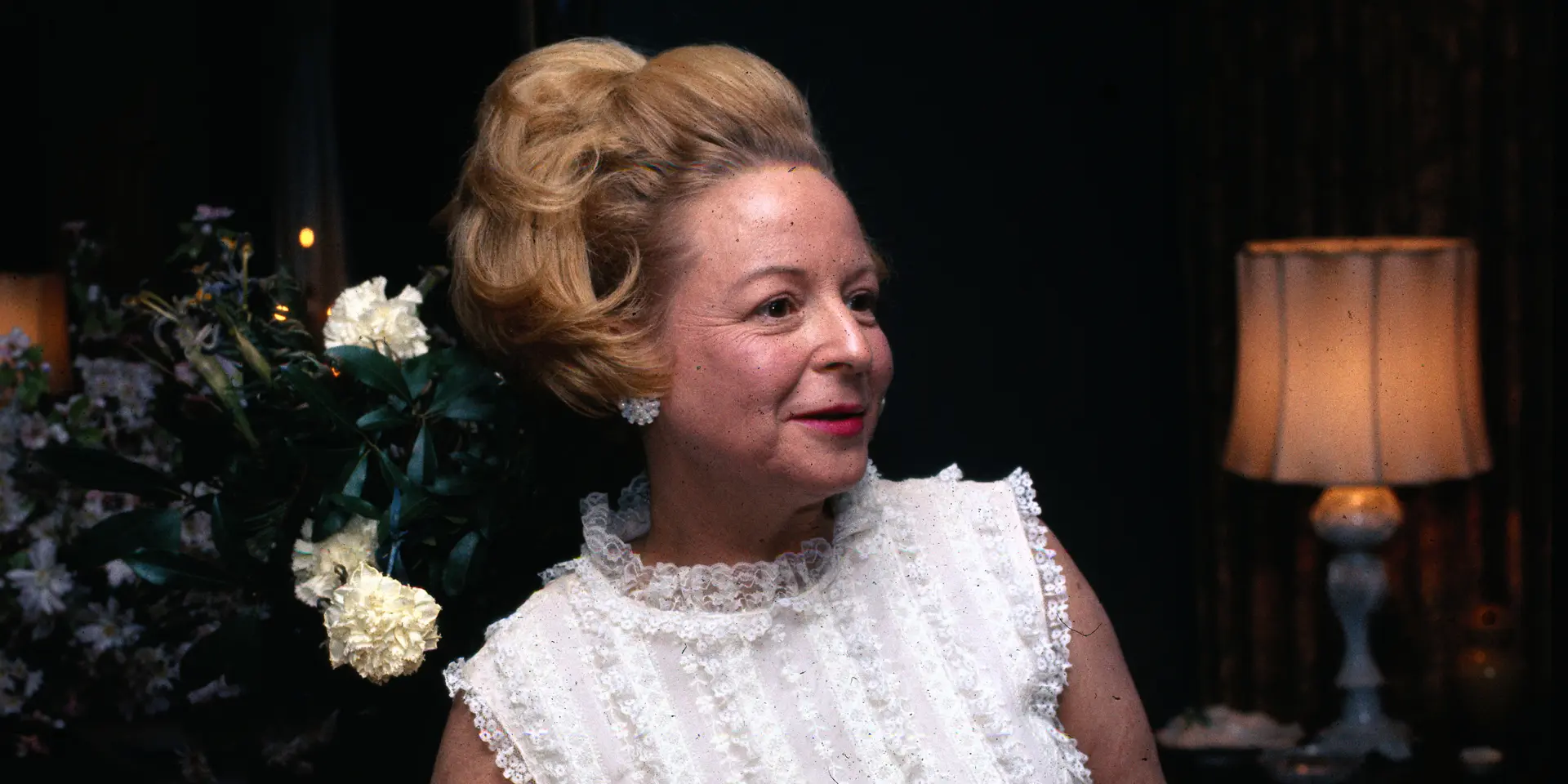Martha Mitchell was a name that often echoed through the newsrooms of the 1970s, her voice becoming a symbol of defiance and courage during one of the most tumultuous periods in American politics. As the wife of John Mitchell, Richard Nixon’s Attorney General, Martha became an outspoken critic of the Nixon administration, famously and vocally opposing the Watergate scandal that would eventually lead to Nixon’s resignation. Her controversial outbursts made her both a target of ridicule and a symbol of truth in the eyes of many.
However, the story of Martha Mitchell extends beyond her public persona and contentious role in the Watergate affair. One of the less discussed aspects of her life is the impact of her tumultuous career on her daughter, born into this vortex of politics, scandal, and media frenzy. Her daughter, of course, was Deborah Mitchell—a figure whose life has largely been overshadowed by the larger-than-life figure of her mother.
In this blog post, we explore the life of Martha Mitchell’s daughter, tracing her journey from childhood through adulthood, how the events surrounding her mother shaped her identity, and the challenges she faced in the shadow of her mother’s complex legacy.
Childhood in the Shadow of Fame
Deborah Mitchell was born in 1953 to Martha and John Mitchell, a couple who, at the time, seemed firmly embedded in the upper echelons of political life. Martha, a Southern belle with a strong personality, was accustomed to attention, but it wasn’t until the early 1970s that she would become a household name for all the wrong reasons.
Growing up in such an environment, Deborah’s formative years were marked by an overwhelming presence of political intrigue and public scrutiny. From a young age, Deborah likely witnessed her mother navigating the high-stakes world of Washington, D.C., where every action, every statement, and every public appearance was subject to intense media scrutiny. However, Martha Mitchell’s fiery personality and public outbursts—while they contributed to her role as a political figure—often brought chaos into the Mitchell household.
For young Deborah, this may have meant having to grapple with a sense of constant instability. The constant media attention and her mother’s controversial positions likely isolated her from the normal childhood experiences that many others take for granted. The public’s obsession with Martha Mitchell could have also created a sense of being overshadowed, with Deborah finding it difficult to emerge from the enormous shadow cast by her mother.
Despite the chaos, Martha Mitchell did her best to raise her daughter in a world that often felt like a circus. Reports from those who knew Deborah during her youth suggest that she was a relatively private person, preferring to stay out of the spotlight while still supporting her mother’s public persona. Still, Deborah’s early life was defined by Martha’s personality and the tumultuous political landscape that surrounded them.
The Watergate Scandal and its Fallout
The turning point in both Martha and Deborah Mitchell’s lives came with the Watergate scandal. Martha’s outspoken criticism of the Nixon administration, including her claims about the President’s involvement in the cover-up, turned her into a controversial and divisive figure. The Watergate affair, which ultimately led to the resignation of President Richard Nixon, cast a long shadow over Martha Mitchell’s legacy.
For Deborah, this period must have been particularly difficult. The Watergate scandal, combined with her mother’s fiery personality, put her family under intense public scrutiny. As the press relentlessly pursued Martha Mitchell’s every move and statement, Deborah was thrust into a spotlight she likely didn’t want or ask for.
While Martha became a figurehead for those who opposed Nixon, she was also labeled “The Mouth of the South” by critics who ridiculed her for her bluntness and her outspoken nature. This public mockery may have had a profound effect on Deborah, who, as a teenager at the time, had to navigate both the emotional challenges of adolescence and the social stigma that came from being associated with a highly controversial figure.
Martha’s role in the Watergate scandal also led to significant personal challenges. She suffered from mental health issues and struggled with substance abuse, which only added to the emotional burden on Deborah. At such a young age, Deborah would have been forced to come to terms with her mother’s breakdown and the deterioration of their once stable family life.
In interviews, Deborah has admitted to feeling torn between the desire to protect her mother and the overwhelming desire to distance herself from the chaos that Martha’s political battles brought into their lives. The Watergate affair, in many ways, marked a turning point for Deborah as she moved into adulthood, away from the intense scrutiny of her childhood years.
A Life After the Spotlight
After the Watergate scandal and her mother’s public downfall, Deborah Mitchell’s life took a turn toward privacy. The years following Watergate were a period of introspection for Deborah, who retreated from the limelight that had often been thrust upon her during her younger years. Unlike her mother, Deborah preferred to avoid public attention and led a quieter life.
There are limited public records about Deborah’s life following the Watergate scandal. However, in the years following her mother’s death in 1976, Deborah took on a more reclusive role. While much about her post-Watergate years remains private, there are some indications that Deborah worked hard to carve out a space for herself away from the media circus that had consumed her family during the Nixon era.
It is important to understand that Deborah’s silence regarding her personal life is part of her calculated effort to protect herself from the same public scrutiny that marred her mother’s legacy. Martha Mitchell’s outspokenness and subsequent controversies left Deborah with a complicated relationship with the public, and she often shied away from the press, preferring to keep her thoughts and actions private.
In recent years, some of Deborah’s personal views have been made public through interviews and writings. Through these, it’s clear that she has a nuanced perspective on her mother’s legacy, seeing both the strengths and flaws in Martha’s character. Deborah has expressed that while her mother’s outbursts were sometimes difficult, she also understood that Martha was a woman who was deeply committed to her beliefs, regardless of the consequences.
Martha Mitchell’s Legacy: Deborah’s Perspective
The relationship between Deborah and her mother, though undoubtedly complicated by the pressures of their unique circumstances, remains a subject of interest. In more recent years, there have been occasional glimpses of Deborah’s perspective on Martha’s life and impact. Some interviews indicate that Deborah, while protective of her mother’s legacy, also viewed Martha as a deeply misunderstood figure.
Deborah acknowledges her mother’s flaws, but she also defends Martha’s courage in speaking out against the wrongdoings she witnessed, particularly during Watergate. In the decades following Martha’s death, Deborah’s quiet reflections on her mother’s life have painted a picture of a woman who, despite her faults, had an unshakable conviction in the face of powerful opposition.
Deborah’s life has, in many ways, mirrored the complexities of her mother’s. Just as Martha fought to carve out her place in a male-dominated political world, Deborah fought to carve out her own identity beyond the public perceptions and media portrayals of her family.
Conclusion
The life of Deborah Mitchell, as Martha Mitchell’s daughter, provides a fascinating lens through which we can understand the impact of public scandal and political intrigue on personal identity. From childhood to adulthood, Deborah navigated the difficult path of being raised by one of the most controversial figures in American political history. The shadows cast by her mother’s life and legacy undoubtedly shaped Deborah’s own journey, yet she has managed to retain a sense of privacy and autonomy in an otherwise chaotic world.
While much of Deborah Mitchell’s life remains private, what is clear is that she has worked hard to define her own legacy, separate from the turbulent world of politics that so heavily influenced her childhood. For those interested in the human stories behind political scandals, Deborah’s journey offers a poignant reminder of the personal costs that come with being the child of someone whose name is forever tied to history.






